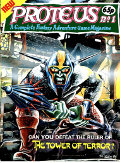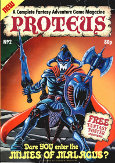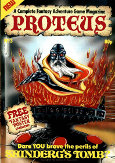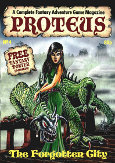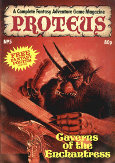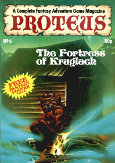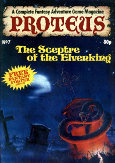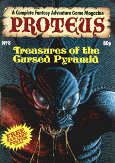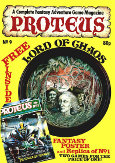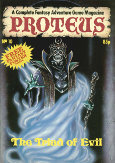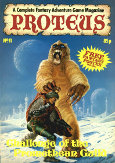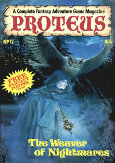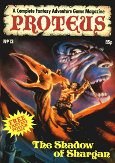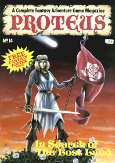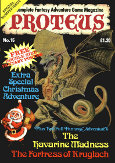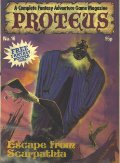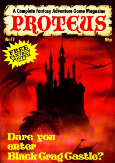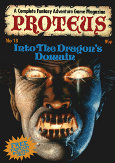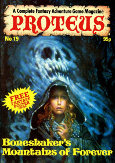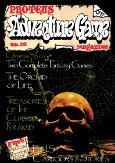The HotU Legacy Collection
Some of you may remember the massive Abandonware site known as the Home of the Underdogs. A few of you may even remember that it had a section devoted to the low-tech predecessors of interactive fiction games: the gamebooks.
After HotU's demise, numerous revival projects came into existence -- but so far, the gamebook collection is missing from every one of them.
to prevent this content from vanishing from off the face of the internet, we decided to host a copy of the collection here on Abandonia.
Note: Some of these gamebooks were planned for addition but never made it to HotU. They were posted by Sarinee in the copy of the partial backup of gamebooks she made available in 2009.
As a child, I grew up with a lot of "Choose Your Own Adventure" gamebooks popular in late 1970s and early 1980s. This page showcases some of the best gamebook and solo adventure/RPG series ever made, including some rare gamebook comics. Since there is a very small chance that these books will see the light of day again, especially since many copyright holders (such Byron Preiss) no longer exists and all these books have been out of print for over a decade, I have decided to scan and compile these gamebooks from my own collection into PDF format, so that old-timers can relive the old days, and younger visitors will have a chance to experience first-hand this primitive-but-fun form of interactive entertainment that was popular long before the rise of computer games.
All books have been scanned and compiled in Adobe PDF format. You can either print it out or play it on-line in Adobe Acrobat Reader (version 4.0 or higher required). Hyperlinks have been added in most books for your convenience, so you can jump to page X or box X by just clicking on "Go to X" passages.
Many gamebooks, especially "solo RPG" adventures such as the Fighting Fantasy series, require you to roll dice to determine combat outcomes. If you don't have any RPG die (6-sided typically), feel free to use this handy RPG Dice Roller or the D&D Dice Roller.
Recommended gamebook links:
- Demian's Gamebook Web Page - the best gamebooks site on the Internet, bar none. Demian's site features a comprehensive database of gamebooks, reviews, gallery, and many more.
- Lairs.com - a wonderful on-line store that sells nothing but gamebooks. Here, you can find many series, including rare classics such as Zork gamebook.
- Project Aon - a must-visit site that provides free downloads of Lone Wolf fantasy gamebooks, courtesy of author Joe Dever.
2000AD: Diceman
 |
 |
 |
 |
 |
The Diceman series is an early, interesting combination of gamebooks and graphic novels, introduced in 1986 as a spin-off of the UK's popular (and non-interactive) 2000AD weekly comic magazine. Billed as a "role-playing comic," Diceman lasted five issues before being discontinued in 1986.
As the name implies, games in Diceman all require you to use dice (typically 2 six-sided ones) to play most games in the book. Each issue includes two to three different games, each starring heroes from the 2000AD magazine, including Judge Dredd, Torquemada, Slaine, Rogue Trooper, ABC Warrior, and Nemesis the Warlock. Given the "adult" nature of 2000AD stories in general (e.g. graphic depiction of violence and some sexual overtones), the games are quite interesting, and more challenging than the Be an Interplanetary Spy series. A nice feature is that each game has different types of gameplay, depending on the main character and the plot. The artwork is consistently very good throughout, and the stories are all action-packed and quite enjoyable. If you like gamebooks, or even just comic books in general, check this one out.
A big thanks to Zarbot Martianbeast, a die-hard gamebook enthusiast, for scanning these rare oldies.
Discuss this series on our forum!
Recommended 2000AD: Diceman links:
Be an Interplanetary Spy
 Find the Kirillian! |
 The Galactic Pirate |
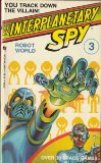 Robot World |
 Space Olympics |
 Monsters of Doorna |
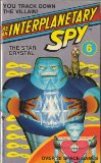 The Star Crystal |
 Rebel Spy |
 Mission to Microworld |
 Ultraheroes |
 Planet Hunters |
 The Red Rocket |
 Skystalker |
Written mostly by Seth McEvoy, this twelve-book series features mostly clichéd sci-fi plots and a simple branching-storyline structure with a lot of illustrations and visual puzzles, which make the books unique and much more video game-like than other, prose-only gamebooks. Most puzzles in the books are mazes and simple pattern recognition/memory challenges, although some are quite creative and clever, such as the many optical illusions and scientific puzzles in later books. On the whole, these puzzles are quite easy, since the books were written for kids (age 5-14) in mind. They are still fun, though, and the plots and alien designs are interesting enough to keep you involved - even if you are no longer fourteen.
Discuss this series on our forum!
Recommended Be an Interplanetary Spy links:
Blood Sword
 The Battlepits of Krarth |
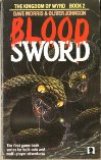 The Kingdom of Wyrd |
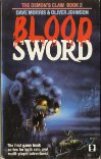 The Demon`s Claw |
 Doomwalk |
 The Walls of Spyte |
Download links for this series have been removed due to request from the copyright owners
Definitely one of the best gamebook series ever released, Blood Sword is an excellent fantasy gamebook series designed more for hard-core RPG players than casual readers. Set in "Legend," the fantasy world expoused in detail in Dave Morris & Oliver Johnson's Dragon Warriors RPG, Blood Sword books are well-written, fun, and challenging.
There are many innovations that make it more memorable than other series: The most intriguing idea is that you can control a party of up to four characters, or play it with up to three other people. Each player controls one out of four available classes: Sage (a fighter/monk), Enchanter, Trickster, and Warrior. The characters are well-balanced, and you can finish the adventures without having all four classes (although it would be quite tough to do that without a Sage).
The combat system is very well designed: the closest to an RPG system I have seen. When you engage in battle, you are shown a diagram of the battlefield before each fight. You can carry characters from book to book, similar to the Lone Wolf series. They are also much longer than your average gamebook: each book contains 500+ passages spread over 300 pages of mostly very descriptive (and at times gruesome) text. If you are looking for a challenging, absorbing, and mature gamebook series, look no further than this out of print and extremely rare classic.
Combat Command
 Cut by Emerald |
 Shines the Name |
 The Omega Rebellion |
 The Legion at War |
 The Black Road War |
Combat Command is a series of "interactive novels" by various authors, all edited by Bill Fawcett, the originator of this series. Each book's adventure is set within an existing sci-fi universe developed by authors within their own novels. For example, one of the books is set in the world of Hammers Slammers by David Drake, while another is set in the world of Starship Troopers by Robert Heinlein. There are three things that set the Combat Command series apart from almost every other gamebook. First, they are set up in "novel" format, with sections sometimes covering four to five pages. Another facet of this format is that the story does not put you in the role of the hero, but rather a character from the existing universe, like Emerald Sheller or Juan Rico, and you make decisions for that character. Second, these are sci-fi stories, while almost all other gamebooks are fantasy, or at best some sort of post-apocalypse story. Third, Combat Command puts you in charge of entire combat units, like an armored brigade or a fleet of starships.... You will fight a lot of battles, and the mechanics for combat are relatively simple and work well. Whenever you fight a combat, you total up the ordnance value of all units involved, and then you roll 2D6 and compare the result to a combat chart, of which there are seven, to represent different types of troop quality and equipment. The result will give you the number of enemy units to eliminate. The system goes back and forth until one side is defeated. If you lose units in a fight, they are gone, unless you have the ability to replace combat losses. This means that a hard-fought but successful victory in an early fight may leave you without adequate troops to successfully complete your mission.
The Cretan Chronicles
 Bloodfeud of Altheus |
 At the Court of King Minos |
 Return of the Wanderer |
Set in the mythologically-rich world of Ancient Greece, this epic trilogy brings an exciting historical dimension to Adventure Gamebooks. You are Altheus, sent to avenge the death of Theseus, your elder brother, whose body lies trapped in the labyrinth of King Minos. The combat system has been extended to incorporate the concepts of honour and shame, two important facets of ancient Greek culture. Honor points are accumulated by doing honorable deeds, while shame is accrued by the opposite. Whenever shame points exceed honor points, decency demands you commit suicide (or the gods will do it for you), and it's game over.
The stories are well-written and more realistic than most gamebooks. Getting hit by an axe was likely to kill you in one go, for example, and you'll feel the repurcussions of your dishonorable or honorable actions (similar to the Karma system in the Marvel Super Heroes gamebook series, but more complex). The game is best described as Fighting Fantasy books set in ancient Greece, where two dice are required and you must keep track of your characters' statistics. Too bad only three books were ever released.
Demonspawn
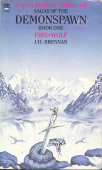 Fire Wolf |
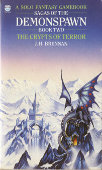 The Crypts of Terror |
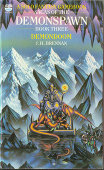 Demondoom |
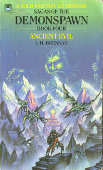 Ancient Evil |
Demonspawn is a very well-written and atmospheric fantasy gamebook series written by J. H. Brennan, celebrated author of the books. Although they lack the humor of GrailQuest, and bombard the player with many tough battles (hence the "advanced" rating), the books are a lot of fun to play. The quality of writing is very high throughout, and there are many fun riddles and logic puzzles to solve along the way. Each book is broken into several chapters, each with a long intro and often a 'cliffhanger' ending. The magic system is confusing to say the least, but fortunately you often have other choices at hand. If you love atmospheric stories with detailed descriptions and memorable characters (like a talking sword), this one fits the bill.
Discuss this series on our forum!
Recommended Demonspawn links:
Dragon Warriors
 Dragon Warriors |
 The Way of Wizardry |
 The Elven Crystals |
 Out of the Shadows |
 The Power of Darkness |
 The Lands of Legend |
Download links for this series have been removed due to request from the copyright owners
Dragon Warriors is a superb RPG designed by Dave Morris and Oliver Johnson and published by Corgi from 1985 to 1986. In contrast to most paper & pencil RPGs, this series features an extremely well designed and logical combat system, excellent magic rules, a wide variety of monsters, and detailed fantasy setting. Above all, the game is easy to learn, and the entire system comes in six books that were retailed for less than $3.00 each, thus allowing people to buy a complete set of FRP rules for less than $20. While it is a clone of TSR's famous "D&D" system in many ways (e.g. use of dice and hit roll), it has enough quirks (particularly the magic system and the way armor is handled) to stand out on its own. If you are looking for a great replacement for the basic D&D system, look no further than this highly underrated classic, which died an early and undeserved death. Gamebook fans may want to take a look at the Blood Sword series, which is set in the DW universe.
Discuss this series on our forum!
Recommended Dragon Warriors links:
Eternal Champions
 The Cyber Warriors |
 Citadel of Chaos |
Probably the only gamebooks in history to be based on a one-on-one fighting game (many issues in the Nintendo Power series were published, but those are other kinds of games), Eternal Champions is a very rare series, based on SEGA's fighting game of the same name, that plays like a good clone of Mortal Kombat. Similar to the better-known Way of the Tiger series, these books emphasize various fighting moves. Combat results are determined by a combination of skills and dice rolls. Good illustrations and a lot of fights against characters from the game characterize this series. Too bad only two issues were published before the series was discontinued.
Fabled Lands
 The War-Torn Kingdom |
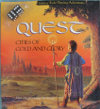 Cities of Gold & Glory |
 Over the Blood-Dark Sea |
 The Plains of Howling Darkness |
 The Court of Hidden Faces |
 Lords of the Rising Sun |
Download links for this series have been removed due to request from the copyright owners
Fabled Lands is one of the most unique, innovative, and addictive gamebook series ever published. The succinct description at Demian's Gamebook Page says it all: "Probably the most intricately designed gamebooks ever published, the Fabled Lands books are all interconnected; each book represents a different segment of a larger world, and it is possible to hop from book to book in a non-linear fashion, completing quests and gaining in experience. Players have six attributes (Charisma, Combat, Magic, Sanctity, Scouting and Thievery) whose initial scores are determined by character profession. There are also Stamina points to represent health and a limited inventory for storing items. Codewords are used in each book to keep track of which areas have already been visited and which major events have already occurred, and there are sometimes places in the text where players may leave behind items to be retrieved later.
The unfortunate thing about this series, though, is that it was never completed; after six volumes, it went out of print, so the entire world is inaccessible to readers. The situation is even worse in the United States, where only two books were published under the Quest label."
Discuss this series on our forum!
Recommended Fabled Lands links:
Falcon
 The Renegade Lord |
 Mechanon |
 The Rack of Baal |
 Lost in Time |
 The Dying Sun |
 At the End of Time |
Download links for this series have been removed due to request from the copyright owners
Written by Mark Smith and Jamie Thomson, whose names must be familiar to all Fighting Fantasy readers, Falcon is set about a thousand years into the future, when aliens and humans met and mingled, and time travel was a reality, accessible through a series of mostly shortlived timeholes. By luck, a permanent one was stationed above Earth in the current year, making it relatively easy to return. What set Falcon apart from the rest was the level of technical detail: Schematics of timeships, spacecraft, weaponry and body armor are on a level with professional design work. The writing is exceptional, laced with a hard edge and a touch of political intrigue. Time travel is a rigidly controlled operation under the auspices of a governmental agency.
A group of Time Lords (a straight steal from Doctor Who) are in control, sending out a number of agents into the field to investigate anomalies and keep a check on the system. As Falcon, the top agent, you are thrust into numerous scenarios endangering not only your life, but the very timelines. Alien Gods, renegade Time Lords, and parallel timelines are some of the dangers you face as you seek to safeguard the universe. A top notch series that deserves to be classed amongst the very, very best.
Aside from excellent writing and detailed schematics, it is worth noting that Falcon also introduced an interesting marketing gimmick: from book #1 through #4, you are given scores for your effort, but you won't know how well you did in the book until you buy the next book in the series (e.g. book #2 will have a scoring sheet for book #1 in the back). This is neat, but somewhat moot in the context of the game since there is only one 'success' ending anyway. Downloads here are the complete 6-book series, with big thanks to wert for helping to track them down.
Fatemaster
 Treachery in Drakenwood |
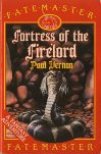 Fortress of the Firelord |
Although only two books were published, Fatemaster remains one of the largest and most ambitious gamebook series ever released. Each book is massive: five hundred passages as opposed to two to three hundred passages in other series, many optional areas and puzzles, and long, well-written paragraphs. Demian says it all in his review of this rare series:
This short-lived fantasy series was published by Unwin in the mid-eighties. Its most notable characteristic is its mapping system: Many sections of the text are accompanied by chunks of a map, and the reader must copy these chunks onto hex or graph paper as he or she plays, thus easily keeping track of which areas have been explored and which haven't. I really enjoy this sort of thing for some reason, and I think many gamebooks could have benefit from maps this precise. The rest of the system is fairly standard, though it does show a bit of creativity. Rather than using hit points, players lose points from their attributes, thus making their characters weaker in combat as they sustain damage. Spell-casting is also nice, with a lengthy list of possible spells to cast, each costing a certain number of points; it's not as flexible or impressive as the Sorcery system, but it's workable. It appears that only two books were released, with a third never making it past the planning stage. Perhaps the series met its end as the direct result of its flexibility - there's so much to do in each book that you almost don't need another one. Still, it's always a shame to see a series die prematurely, and while the end of Fatemaster isn't as tragic as the failure of Fabled Lands, it would have been nice to watch the series evolve further.
Find Your Fate
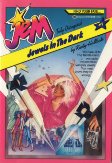 Jewels in the Dark |
One of the most curious gamebook series, Jem is part of Random House/Hasbro's Find Your Fate gamebooks line. The series uses typical Choose Your Own Adventure format: two or more action choices at the bottom of each page. The interesting thing is that it was designed for girls, as the series was based on an 80's cartoon series (and Hasbro's quite successful doll line) about the world of girl glam rock. Six books were published before it was discontinued st some point in the mid-80s.
Discuss this series on our forum!
Recommended Find Your Fate links:
Free Gamebooks
| Invaders | Ring of Thieves | Windhammer Special Edition |
In the author's words, from the official download site: "Invaders was originally written for a series that was planned by Penguin Australia in the late 1980s, but which did not endure past the release of its first title. I wrote this when I was feeling rather homesick in a four-mat hotel room in the suburb of Iogi in Tokyo." You play a bush doctor/dentist in the remote town of Cabralowie, Australia. Your task is simply to survive 24 hours in this survival/horror adventure, which is quite well-written and interesting, with unique skills such as "bush skills" and "cricket playing." Combat is a little too simplistic, however.
Ring of Thieves is a huge (20,000+ words long) solo adventure based on the free Risus: The Anything RPG system, in which the characters are literally defined by clichés, and these are used the way attributes and skills are in other games. Demian's comments: "I quite enjoyed this adventure; it's a challenge to get through, but it's not so linear that there's only one correct path. Characterization is definitely much stronger than is usual for a solo adventure, and the story's sword and sorcery plotline is pleasantly spiced up from time to time by humor and strangeness. The adventure isn't completely perfect; it's a bit on the short side (at least by Fighting Fantasy or Lone Wolf standards), and the ending leaves a few things (intentionally) unexplained. Both of these flaws are easily forgiveable, however; this is (I hope) only the first part of a series, and room had to be left somewhere for future growth and improvement."
Windhammer is a well-written fantasy solo RPG, part one in the Chronicles of Arborell series. The series is designed in a manner reminiscent of the classic Fighting Fantasy and Lone Wolf books, and while it must be played through a web browser, it retains the old gamebook feel by requiring the reader to roll dice and keep track of statistics on a printed character sheet. Includes over 260 sections and some clever plot twists.
Recommended Free Gamebooks links:
- BRAD the game
- Buffalo Castle
- Challenges of the Black Gate
- Choose Your Own Damn Adventure
- Chronicles of Arborell
- Dragonlord
- Fudge - The Wizard's Tower
- Krik or Treat
- Morris's Marvellous Solo Adventure Game
- Nightcat -- a Solo Adventure
- Partners
- Project Aon
- The Protectors
- Ring of Thieves
- SPARKS Nulvac Solitaire (dead link)
- Zork Book 3 - Caverns of Doom
Freeway Warrior
 Highway Holocaust |
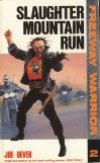 Mountain Run |
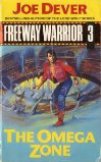 The Omega Zone |
 California Countdown |
One of my favorite titles, Freeway Warrior is a four-book series written by Joe Dever of Lone Wolf fame. From the book: "You are Cal Phoenix, the freeway warrior, champion and protector of Dallas Colony One. A murderous gang of H.A.V.O.C. clansmen, led by the psychotic Mad Dog Michigan, are bent on destroying your fragile colony as it crosses the wastelands of Texas on the first stage of a life-or-death exodus to the California coast. These bike-riding clansmen are a formidable enemy: armed, cunning, and extremely dangerous, capable of launching a lightning raid at any time, day or night. You will need all your wits about you if you are to defend your people and reach your destination intact."
Like other Joe Dever classics, this series is full of interesting characters, great atmosphere, and excellent combat and puzzles. A random number table is included in the back of each book, so there's no need to carry dice around when you want to play. Like Lone Wolf, you can play each book separately, but playing them in order is recommended, because they follow a chronology (starting with Cal's departure in Book #1 and ending with his arrival in California in Book #4). If you like gamebooks, this series is a must-read. And if you don't, this is the one series that will convert you.
Discuss this series on our forum!
Recommended Freeway Warrior links:
Golden Dragon
 Crypt of the Vampire |
 The Temple of Flame |
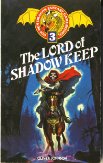 The Lord of Shadow Keep |
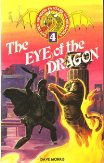 The Eye of the Dragon |
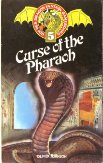 Curse of the Pharaoh |
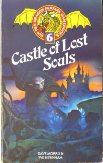 Castle of Lost Souls |
Download links for this series have been removed due to request from the copyright owners
The nice summary blurb at FightingFantasy.com says it all about this well-written gamebook series from two of the best authors in the business: "In some ways a precursor to the Dragon Warriors gamebooks, Golden Dragon Fantasy Gamebooks were enhanced by a good, basic system enriched by the quality of the writing, which gave the books a level of atmosphere unequalled by most. The two main writers were Oliver Johnson and Mark Smith, sometimes in tandem, mostly by themselves. The first book, Crypt of the Vampire, set the tone of the series. Taking up a well-worn plot (kill the Vampire Lord), the authors managed to create a menacing, dangerous tone that impressed me no end. Nice internal illustrations helped create the mood. The system of generating character stats and fighting was basic, but the better for not cluttering up the books.
I have exceptionally fond memories of this system, some of whose background as revealed in the Temple of Flame formed the basis for the Dragon Warriors world, Legend. For completists, an issue of White Dwarf (sometime between issue 80-100) contained a shortened version of the Castle of Lost Souls book."
Our collection for download here is the complete six-book series.
GrailQuest
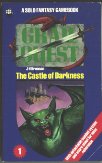 The Castle of Darkness |
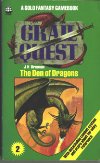 The Den of Dragons |
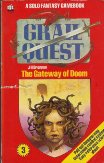 The Gateway of Doom |
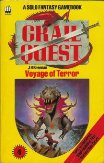 Voyage of Terror |
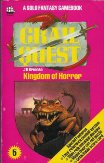 Kingdom of Horror |
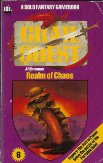 Realm of Chaos |
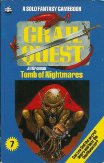 Tomb of Nightmares |
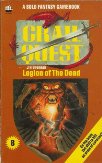 Legion of the Dead |
Robert Mammone's description of this superb - and very funny - gamebook series says it all: "J.H. Brennan, who created the game system Man, Myth and Magic, and has written numerous books on topics ranging from New Aeism to time travel, took the main elements of the Arthurian myth and created the wonderful world of GrailQuest. You are Pip, protege of the Wizard Merlin, wielder of Excalibur Junior (EJ), caster of mighty magics and defender of the realm against dragon hordes, undead magicians and marauding monsters. Clearly, GrailQuest was written by an author well versed in the absurd, but capable of harnessing it to a very, very good story. Not as many references as the average FF book, and sometimes put together in a rather ramshackle fashion, GrailQuest is distinguised by its easy to learn system, the preponderance of items you could find to enhance your fighting ability, and an absolutely silly magic system which captured the tone of the books perfectly. Written during the high tide of [gamebooks], GrailQuest perfectly captured my imagination, and remain the high point of these books. A very grave pity Brennan either didn't carry on, or wasn't allowed to."
All the books are well-written, accessible, and a blast to play. Sometimes the jokes are a bit too juvenile, but that is probably due to the age of the series' target audience being on the lower end than most. Also, be wary of book #6: it has one of the most unforgiving - and therefore infuriating - mazes I have ever seen. Other than that, sit back and enjoy some of the best gamebooks ever written.
Knightmare
 Fortress of Assassins |
 The Sorcerer`s Isle |
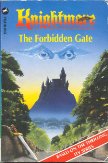 The Forbidden Gate |
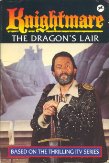 The Dragon`s Lair |
Description and comments on this rare gamebook series from Demian's superb gamebook site:
"This six-book series is based on the ITV fantasy game show of the same name. As in the show, players race through the dungeon of Knightmare Castle, attempting to complete quests before their Life Force runs out. The rules used by the books are simple, generally only covering Life Force, inventory management and spell-casting. The first four books were released by Corgi and the last two by Yearling; these latter two books are larger-format than their predecessors and are designed for a younger audience.
I was quite fortunate to collect this entire series quickly and unexpectedly; an eBay win covered most of it, and the couple of books missing from that lot were easy enough to find. Excited by my acquisition, I had to make a priority of reading through it. I'm glad I did, though most of the good points of these books come from their novellas and not their interactive portions. It's interesting to see this much continuity in a series that had one-year gaps between the release of its volumes; one wonders if they were written more closely together than they were published. Also interesting is the fact that the advice given in the very first book holds true throughout the series even though not all of it is repeated -- most vital is the fact that one can rarely go wrong by taking a right-hand path; this certainly aided in my rapid completion of the series."
Discuss this series on our forum!
Recommended Knightmare links:
The Legends of Skyfall
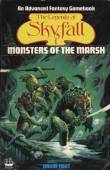 Monsters of the Marsh |
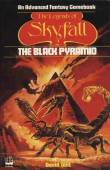 The Black Pyramid |
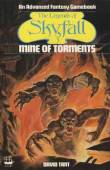 Mine of Torments |
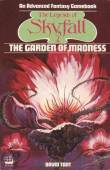 The Garden of Madness |
Released in 1985, the 4-book Legends of Skyfall series features a unique system based on coin tossing rather than six-sided dice. The setting is innovative as well: an alien planet that had been settled by humans who had sunk back into a quasi-medieval political system, with remnants of technology that are mistaken for magic. Detailed maps and interesting setting aside, the books suffer from unclear rules, a lot of aimless wandering, and lack of detailed descriptions for NPCs and locations. Demian Katz noted on his gamebooks website that "...apparently the storyline is based on an AD&D campaign played by the author of the books, though the rule system fails to resemble that game." Worth a look for gamebook fans looking for something different, but in this case novelty alone is no substitute for fun - unfortunately.
Marvel Super Heroes
 The Amazing Spiderman |
 Captain America |
 The Thing |
 The Uncanny X-Men |
 Daredevil |
From Demian's description: "The Marvel Super Heroes books were released the same year as the Car Wars books, and they targeted the same audience. Character bookmarks were included with each book. Eight of these books were released before the series met its demise."
Based on the Marvel Super Heroes pen & paper RPG, this series are generally well-written and features interesting innovations, such as "karma" points, which will increase when you do good deeds (these points can then be used to, for example, replenish your hit points), and situations where you are required to perform a "Feat" using superhuman powers. One six-sided die is required to play each game, and the combat system is quite simple despite the fact that each superhero is given numerical skills in different categories. If you like Marvel comics, this series is well worth checking out.
Maxi-Solo
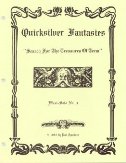 Search for The Treasure of Term |
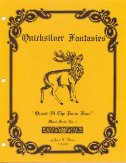 Quest of The Roan Hart |
The Maxi-Solo series is a set of quick-and-dirty solo fantasy RPGs aimed at people who are new to RPGs in general. They were produced in the early 1980s by a small, now-defunct US-based company called Quicksilver Fantasies, which also developed the Mini-Solo series (same gameplay module, but shorter length). The games’ production value is minimal: each game is a bunch of typed-up sheets sold in a ring binder, with crude illustrations and quite a few typos. The games are quite hard – not so much because they require a lot of skill as a lot of luck, i.e. numerous die rolls. You also have to update your player’s statistics quite often in the game and constantly calculate many things, such as damages based on given probabilities. Decent writing and good replayability (due to many choices and even character types) make this series worth a look, however.
Recommended Maxi-Solo links:
Middle-Earth Quest
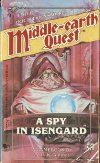 A Spy in Isengard |
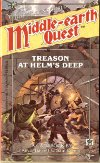 Treason at Helm`s Deep |
Iron Crown Enterprises (I.C.E.) got a license from the Tolkien estate to produce role-playing games based on the Middle-earth property. This resulted in the acclaimed MERP (Middle-Earth Role Playing) RPG system and games, which lasted quite a while. In 1985, they released a pair of Tolkien Quest gamebooks. In 1986, they followed up with a third book, changing the series name from Tolkien Quest to Middle-Earth Quest.
It was somewhere around this time that the Tolkien estate objected to these books -- apparently they considered them to be books, not games, and thus not covered by I.C.E.'s license. The books quickly disappeared from the market and I.C.E. presumably lost quite a bit of money. It seems that the licensing issues were eventually sorted out, though, because in 1988, the Middle-earth Quest series rose again, starting at #1 as if the original three had never existed. Four titles were published (and five more announced but left unreleased) before the series disappeared again. Interestingly enough, I.C.E. cited the Middle-Earth Quest licensing disaster as a major reason for their decision to file for Chapter 11 bankruptcy protection in 1999. Since then, the company has been re-organized and re-launched with a new line-up of RPGs based on original titles.
Books in both the Tolkien Quest and Middle-Earth Quest series are very well-written and challenging. The books could be played by themselves using the built-in QuestGame system, or they could be used as solitaire modules for the MERP system, which incidentally is one of the best RPG systems I have seen. Every book ships with a map (included as color insert in the book) of hex locations you can move to as you play the game. With solid writing, excellent RPG system, and sheer length (over 400 paragraphs each), this series remain one of the best gamebooks ever made, and one of the most sought-after. Thanks once again to Zarkob Martianbeast for scanning these rare oldies for us :)
Discuss this series on our forum!
Recommended Middle-Earth Quest links:
- Official I.C.E. Site - back in business after reorganization, without the Tolkien license.
- Other Hands - Owned and run by the former assistant editor of the MERP series, this is the largest MERP-related site on the Web.
- MERP Product Catalogue - a very comprehensive on-line listing of all MERP games before they were discontinued in 1999.
Narnia Solo Games
 Return to Deathwater |
 The Sorceress and the Book of Spells |
 Leap of the Lion |
 The Lost Crowns of Cair Paravel |
This rare gamebook series is based on C.S. Lewis’ beloved Narnia fantasy series. Designed by Iron Crown Enterprises, the same company that designed the Middle Earth Quest and Sherlock Holmes Solo Mysteries gamebook series, Narnia Solo Games books are similar: you have to allocate points to six "stats" at the beginning, including fighting, trickery, talking, etc. Dice rolls are used to decide the outcome of many events, but a random number table is included in every book if you don’t want to use the dice.
The books do a great job of evoking the Narnia universe, and even anyone who hasn’t read Lewis’ works will be able to enjoy them, thanks to detailed descriptions and long narratives. Like the original books (which are pretty much based on many Christian values), many of the choices you’ll have to make will be of a moral nature. But the authors succeed in making them challenging without being didactic. All the books also include optional puzzles/paths, keeping the replayability quite high. Overall, another solid series from ICE that should keep RPG and C.S. Lewis fans happy.
Discuss this series on our forum!
Recommended Narnia Solo Games links:
Nintendo Adventure Books
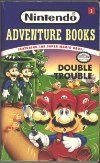 Double Trouble |
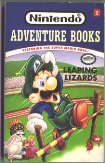 Leaping Lizards |
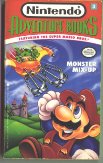 Monster Mix-Up |
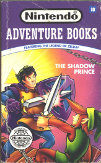 The Shadow Prince |
Nintendo Adventure Books is a series of gamebooks released between 1991 and 1992. Of all the 12 books released, only #9 and #10 (The Crystal Trap and The Shadow Prince) were based on the Zelda series. The other ten books are based on the Super Mario series of games. Designed for kids, each book is easy to read, interspersed with pictorial puzzles and illustrations. Puzzles are generally easy (e.g. "guess the word" puzzles, and mazes), but there are many optional paths that urge the players to replay the game to get an "optimal" score (typically the number of coins collected) at the end.
Some of these books were also made promotional material - you could get them by sending in two UPCs from Pringles. These books had "Pringles Special Edition" printed on the top of their covers.
Non-Game Comics
 Paul Auster`s City of Glass |
This is a small collection of non-game comic books (mostly graphic novels) that I feel are underrated and worth preserving, especially now that they are out of print. If there's an out-of-print comic that I really like, chances are you'll see it here. If you are a fan of graphic novels/comics, I hope you'll enjoy this collection. If you think comics are "for kids only," these works may change your mind ;)
One-hit Wonders
Discuss! Barbarian Prince |
Discuss!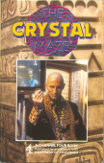 The Crystal Maze |
Discuss!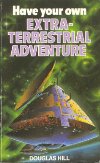 Have Your Own Extra-Terrestrial Adventure |
Discuss!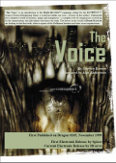 The Voice |
Discuss!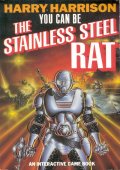 You can be the Stainless Steel Rat |
This collection features gamebooks that were released individually, either as one-of-a-kind gamebooks or as the start of a slated series that met a premature end. In either case, they are much rarer than serial gamebooks, and the usually unique content makes them well worth a look - and hunting through bargain bins to find.
Proteus
Demian's overview: "This series of gamebooks was actually published as a monthly magazine; however, apart from the unusual format and the inclusion of advertisements, it resembles any other line of British fantasy gamebooks. The rules, which make use of six-sided dice (sets of which were included attached to some issues), are very much in the Fighting Fantasy, vein, though their exact details vary from issue to issue. They generally include a few main attributes, the need to manage inventory items, and spells or other abilities.
A miniature reprint of the first issue was attached to the front cover of the ninth issue, while the fifteenth issue included a reprint of the sixth issue along with a bonus adventure called "In Search of Christmas." Regular publication stopped at issue nineteen, but a twentieth volume was released as a "special" containing an original story plus a reprint of issue eight."
Real Life Gamebooks
 The French Revolution |
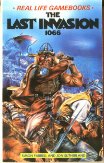 The Last Invasion, 1066 |
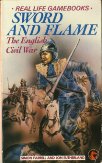 The English Civil War |
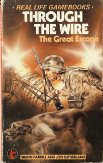 The Great Escape |
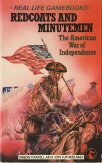 Redcoats and Minutemen |
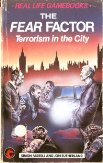 Terrorism in The City |
Real Life Gamebooks is a fun 8-book series written by Simon Farrell and Jon Sutherland, published widely in the UK and not so widely outside Europe. In contrast to most gamebook series, Real Life Gamebooks, as the name suggests, is not set in a fantasy world, but in actual history. Each book places you in the middle of a famous historical event: the French Revolution, the US Civil War, World War II, and more. Using a basic system that comprises a few skills and dice rolls, the author duo succeeded in not only providing a decent basic history lesson, but also an entertaining diversion. The books are all well-written, and offer you the chance to take sides and see the consequences. All in all, though not as complex or well-researched as the better-known Time Machine series, Real Life Gamebooks are still a lot of fun and well worth a play-through.
Sagard the Barbarian
 The Ice Dragon |
 The Green Hydra |
 The Crimson Sea |
 The Fire Demon |
Sagard the Barbarian is a good gamebook series that serves as an excellent introduction to anyone not familiar with gamebooks or pen & paper RPGs in general. From Demian Katz' overview: "...this series of four books was released by Archway paperbacks in 1985 and 1986. The books were co-written by Gary Gygax, one of the creators of Dungeons & Dragons, and they featured a rules system including hit points, experience points, inventory and combat. Randomization was achieved with a four-sided die or by flipping through the pages. As in the Lone Wolf books, character statistics were carried from book to book."
One thing I like about the series is that each book includes a neat non-RPG mini-game to add variety. These are typically short board games with specific rules you must follow. The books are also well-written - the authors make up for the low number of sections (120+ compared to 350+ for most other gamebooks) by a detailed and atmospheric narrative. Although the prose is sometimes sophomoric and clichéd, with a big-muscled-barbarian-seduced-by-nubile-women kind of plot (which probably can only be expected to a certain extent, since this was targeted at male teenagers), this is still a fun series that should please every RPG/gamebook fan... except anyone who dislikes frequent dice-rolling.
Sherlock Holmes Solo Mysteries
 Murder at the Diogenes Club |
 The Black River Emerald |
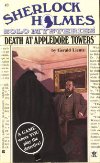 Death at Appledore Towers |
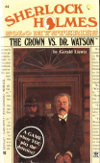 The Crown vs. Dr. Watson |
Sherlock Holmes Solo Mysteries is a fun gamebook series based on the world's most famous fictional detective. You don't play Holmes himself in the books, but his apprentice who's learning the trade. The game system is similar to Middle Earth and Narnia gamebooks (also from ICE), but somewhat simplified: you won't need to keep track of many inventory items, and only there are only six skills (atheletics, artifice, communication, intuition, observation, and scholarship) that affect your chances of accomplishing certain actions. As can be expected from the murder mystery genre, the books are quite linear: there is only one "correct" solution to each case. The games are also quite forgiving - if you guess the wrong answer when Holmes asks you who the guilty party is, you can still proceed to the passage where Holmes reveals the solution (with a frown at you, of course).
The cases are not on par with original Sherlock Holmes stories, but most of them are at least somewhat interesting, and the writing is faithful to the original. Worth a look, especially if you enjoy mystery adventures. This is also one of the rare gamebook series that aren't set in a fantasy world.
Discuss this series on our forum!
Recommended Sherlock Holmes Solo Mysteries links:
Soundway to Reading
| Soundway to Reading - Which Way Books #2 |
A really interesting 20-minute audio book based on Simon & Schuster's Which Way gamebook series. The narrator reads the book based on choices he makes, but at the end he goes back to make different major choices, and read those alternate paths to the end. The book itself is quite interesting too, as Demian says in his synopsis: "...not many gamebooks mix horror, science fiction, and espionage, and though the plot device this one uses is pretty cheesy, it's still a lot of fun. As with most books in this series, the game design is of much higher quality than the actual writing."
This download is MP3 files of the whole tape - thanks to Zarkob Martianbeast.
Star Challenge
 Planets in Peril |
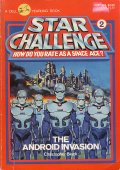 The Android Invasion |
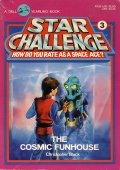 The Cosmic Funhouse |
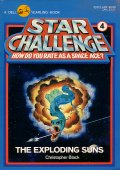 The Exploding Suns |
Star Challenge is a ten-book series published under the auspices of Dell's Yearling division, a division set up to print children's books. Aimed at kids aged 8-12 years old, the series is reasonably well written and is at the right difficulty level for this age group, although neither the puzzles nor the premises are as fun as the far superior Be an Interplanetary Spy series. There is good use of a wisecrack robot companion named 2-Tor, and big font to make the books readable for younger kids. Each book offers multiple endings - you can die in several ways, or be awarded different scores depending on which ending you get. All in all, a decent series for younger kids that is far from the quality of Be an Interplanetary Spy or Knightmare.
Storytrails
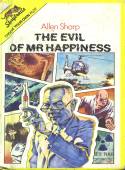 The Evil of Mr. Happiness |
Description from Demian's page about this ultra-rare series: "This series, originated by Cambridge University Press in 1982, consists of simple, Choose Your Own Adventure style books free from dice-rolling or other game mechanics. Despite their mechanical simplicity and the fact that (like most gamebooks) they're aimed at children, they feel like they're aimed at a more mature audience than most of their American counterparts. Speaking of American counterparts, the series was re-released in North America in 1984 by Regensteiner Publishing Enterprises, Inc."
TutorText
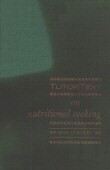 TutorText on Nutritional Cooking |
One of the earliest 'gamebooks,' this is a TutorText on cooking that spans a wide variety of recipes. As in most TutorText, picking a wrong answer from the list of multiple choices will get you to a paragraph that explains why you are wrong, and asks you to go back to choose again. I find the recipes in this book not all that interesting - but then again, perhaps cooking was much more boring in the early 1960s than today.
Virtual Reality Adventure
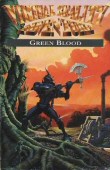 Green Blood |
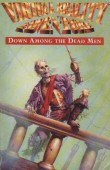 Down Among the Dead Men |
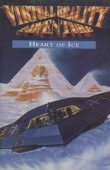 Heart of Ice |
Download links for this series have been removed due to request from the copyright owners
Demian's overview: "These books, published toward the end of the popularity of gamebooks in the United Kingdom, were designed as a sort of diceless answer to Fighting Fantasy. Many of the books have more experimental, unconventional plots than the average gamebook, and the entire series contains no random elements at all. At the start of each book, the reader picks a character from a list of pregenerated options. Characters consist of a list of skills, a number of Life Points and a list of equipment and money. During play, success or failure in various actions is determined by whether or not the chosen character has the appropriate skills for the job. In 2000, a few years after the end of the series, author Paul Mason started the Panurgic Adventures line, reprinting one of the books from this series; further titles have been announced, but it is yet to be seen whether or not they will be produced."
The Way of the Tiger
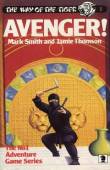 Avenger! |
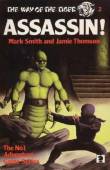 Assassin! |
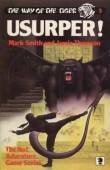 Usurper! |
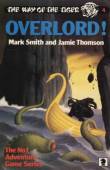 Overlord! |
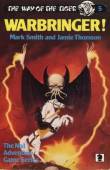 Warbringer! |
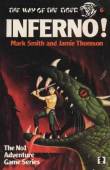 Inferno! |
Download links for this series have been removed due to request from the copyright owners
One of the best gamebook titles ever made, The Way of the Tiger is a 6-book series with strong Oriental influence (similar to Origin's Moebius series of computer games). Written by Mark Smith and Jamie Thomson, and published by Knight Books between 1985 and 1987, the series stars your character as a trained ninja warrior, tackling all manner of evil in the world of Orb. Similar to other RPG-style gamebooks, each book in the series can be played separately, but playing them in sequence is recommended to grasp a large and complex overall storyline. The coolest part of these books is the combat system: you have a number of martial arts moves at your disposal (with names like "Teeth of the Tiger Throw" and "Leaping Tiger Kick"), as well as some very nifty ninja abilities (including the ability to feign death, shoot poison darts and shuriken, and escape from chains).
The passages are much longer and more descriptive than your average gamebook, and while the Japanese mythos sometimes appears hokey and bordering on stereotypical, the series as a whole is very well-written and provides well-balanced gameplay. If you like gamebooks, this series is a must-read.
Discuss this series on our forum!
Recommended The Way of the Tiger links:
Zork
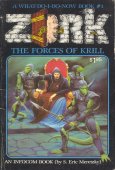 The Forces of Krill |
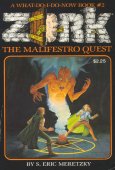 The Malifestro Quest |
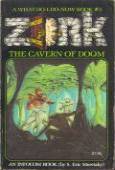 The Cavern of Doom |
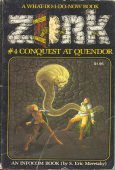 Conquest at Quendor |
From Andrew Schultz' overview of this series based on on of Infocom's most famous text adventures: "The Zork gamebooks were about a hundred and twenty pages each and had only ten puzzles. Like the game it kept score, although unlike the game you got only one point for each puzzle. Most of the time at the story's end you got another try, except in certain amusing situations. The pattern was very linear (in fact, you almost exclusively moved forward in pages through the book) and it was almost like a story-book in that regard. The books were written in the third person, as you make the choices for two likable youngsters named Bill and June, who become Bivotar and Juranda when they enter Zork and are guided by King ("Uncle") Syovar.
The books had much of Zork's humor (the cover page was especially catchy, being an early start to the gamebook!) although they couldn't really capture the intricacies of the puzzles. Indeed, whenever they tried to be non-linear, they usually admitted inconsistencies. However, running jokes like a cheater trap in each book, along with characters that reappeared, made these books very likable."
Overall, a fun gamebook series that fans of the games will enjoy, although the puzzles are far too easy to challenge any gamebook fan.
Discuss this series on our forum!
Recommended Zork links:
Content sourced from The Home of the Underdogs | Coding and layout by Abandonia Crew
